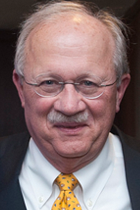Gregory Staley

Professor Emeritus, Classics
Professor, Honors Humanities
1210 Marie Mount Hall
Get Directions
Gregory A. Staley, Professor of Classics, taught at the University of Maryland at College Park from 1979 to 2021. His work at Maryland constituted a return of sorts, since he first began his study of Latin at North Hagerstown High School in Maryland. Professor Staley earned his A.B. in Latin at Dickinson College in Carlisle, PA, where he received the Filler Prize in Classics. He was a Proctor Fellow at Princeton University, receiving there both his M.A. and Ph.D. in Classics. He did postgraduate work as a Rome Prize Fellow at the American Academy in Rome.
Professor Staley's research focused on the Roman writer Seneca and on the American reception of the Classics. His book Seneca and the Idea of Tragedy was published by Oxford University Press in 2010. He edited American Women and Classical Myths, a series of essays by various scholars on American women and their reactions to classical myths in a book published by Baylor University Press in 2008; he contributed the introduction and a chapter titled "Wonder Women in America" on the myth of the Amazons. His published articles range from Juvenal ("Juvenal's Third Satire: Umbricius' Rome, Vergil's Troy") to Washington Irving ("Rip Van Winkle's Odyssey") and he contributed chapters on topics such as " 'Beyond Glorious Ocean': Myth, America and Feminism," "Freud's Vergil and T.S. Eliot's Seneca."
Professor Staley won an award for his excellence in teaching from the American Philological Association (now the Society for Classical Studies) and was named as their mentor by three students selected as Phillip Merrill Presidential Scholars. He served as director of the Honors Humanities Program for seven years, more than doubling the size of the program. When he first came to Maryland, Professor Staley was asked to take charge of the department's annual Latin Day. He won a grant from the National Endowment for the Humanities to support Latin Day for three years and to develop in connection with it new teaching materials which assisted teachers in using Latin to teach about Roman culture. These materials have been published in a collection titled Speculum Romanum. He continued his work with teachers through a second grant funded by NEH, which supported a summer institute titled "The Songs of Muses: Approaches to Classical Mythology" in 1990, and a third, which supported a series of seminars for teachers titled "Novus Ordo Seclorum: America's Classical Traditions," held in 2005.

